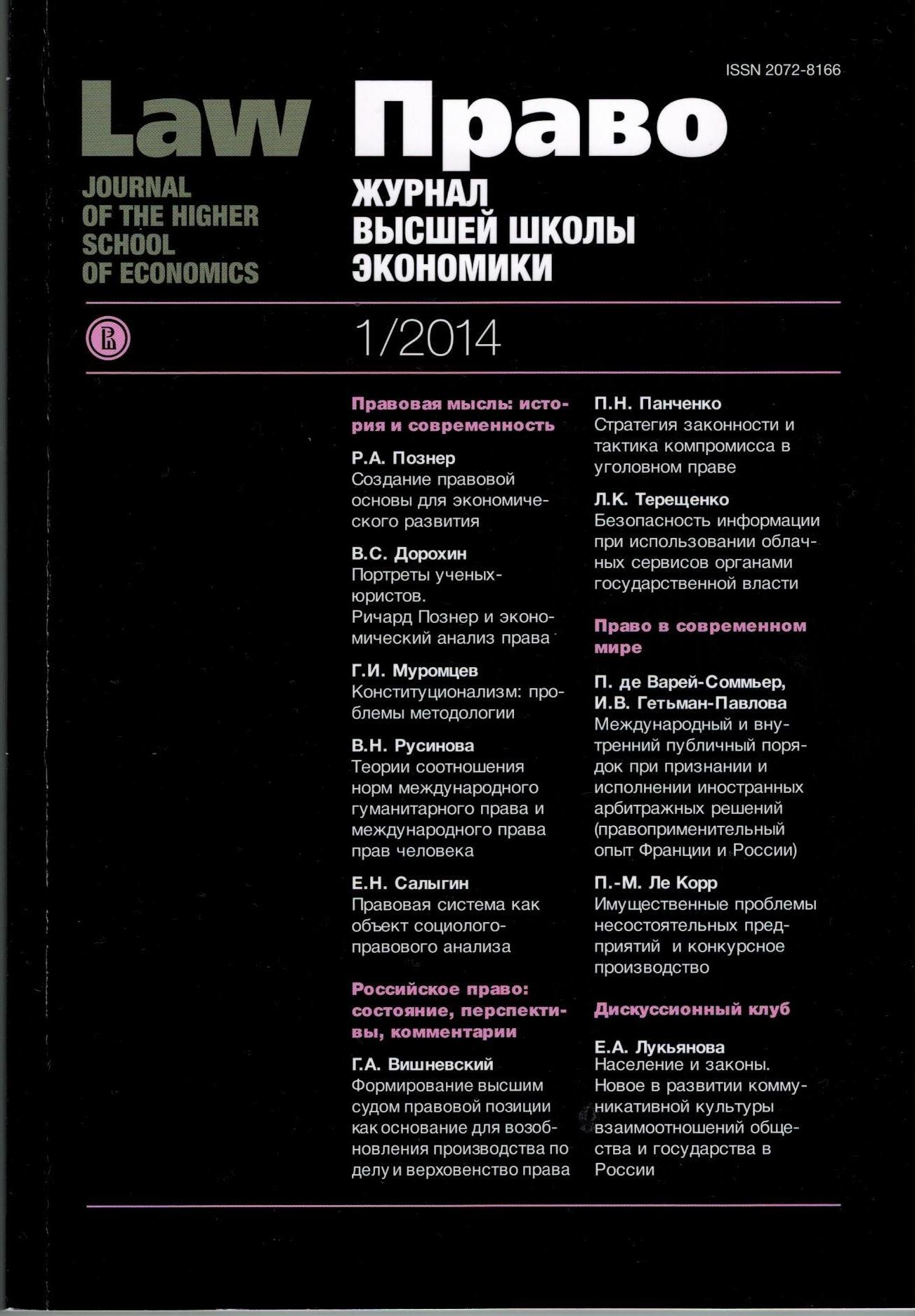Creating a Legal Framework for Economic Development
Abstract
A modernizing nation's economic prosperity requires at least a modest legal infrastructure centered on the protection of property and contract rights. The essential legal reform required to create that infrastructure may be the adoption of a system of relatively precise legal rules, as distinct from more open-ended standards or a heavy investment in upgrading the nation's judiciary. A virtuous cycle can arise in which initially modest expenditures on law reform increase the rate of economic growth, in turn generating resources that will enable more ambitious legal reforms to be undertaken in the future. Legal reform is an important part of the modernization process of poor countries, but the focus of such reform should be on creating substantive and procedurally efficient rules of contract and property rather than on creating a first-class judiciary or an extensive system of civil liberties. This is a general prescription, however, and the proper legal structure for an individual country will depend on a host of considerations. The fundamental tradeoff is between making a rather modest investment in better rules and making a big investment in the judiciary. The more costly it is to create a high-quality independent judiciary, the more beneficial it is to focus legal reform on the adoption of substantively and procedurally efficient rules. Indeed, if the law's administrative infrastructure is sufficiently weak, even good rules may simply be ignored. Economic progress is possible with little—perhaps with no—law and can be stifled by excessive investment in public-sector projects, including legal reform. A small expenditure on law reform can increase the rate of economic growth, which will in turn generate additional resources for more ambitious legal reforms later.
References
Barro R.J. (1991) Economic Growth in a Cross Section of Countries // Quarterly Journal of Economics. № 106. P. 407-443. DOI: https://doi.org/10.2307/2937943
Becker G. (1993) Human Capital: A Theoretical and Empirical Analysis with Special Reference to Education. 3d ed. Chicago: University of Chicago Press. DOI: https://doi.org/10.7208/chicago/9780226041223.001.0001
Becker G., Stigler G.J. (1974) Law Enforcement, Malfeasement, and Compensation of Enforcers // Journal of Legal Studies. № 3. P. 1-18. DOI: https://doi.org/10.1086/467507
Casella A. (1996) On Market Integration and the Development of Institutions: The Case of International Commercial Arbitration // European Economic Review. № 40(1) P. 155-186. DOI: https://doi.org/10.1016/0014-2921(95)00044-5
Dakolias M. (1996) The Judicial Sector in Latin America and the Caribbean: Elements of Reform. Technical Paper. № 319. Washington, D.C.: World Bank. DOI: https://doi.org/10.1596/0-8213-3612-6
Dreze J., Sen A. (1995) India: Economic Development and Social Opportunity. New Delhi: Oxford University Press. DOI: https://doi.org/10.1093/oso/9780198290124.003.0002
Ford C.A. (1996) The Indigenization of Constitutionalism in the Japanese Experience // Case Western Reserve Journal of International Law. № 28(1). P. 3-62.
Gray C.W. (1991) Legal Process and Economic Development: A Case Study of Indonesia // World Development. № 19(7). P. 763-778. DOI: https://doi.org/10.1016/0305-750X(91)90131-Z
Gray C.W. (1997) Reforming Legal Systems in Developing and Transition Economies // Finance and Development. № 94(3).
Hay J.R., Shleifer A., Vishny R.W. (1996) Privatization in Transition Economies: Towards a Theory of Legal Reform // European Economic Review. № 40(315). P. 559-568. DOI: https://doi.org/10.1016/0014-2921(95)00069-0
Hendley K., Ickes B.W., Ryterman R. (1997) Observations on the Use of Law by Russian Enterprises // PostSoviet Affairs. 13(1). P. 19-41. DOI: https://doi.org/10.1080/1060586X.1997.10641431
Herbert H.P. (1995) The Chinese Concept of the Individual and the Reception of Foreign Law // Journal of Chinese Law. № 9(2). P. 207-221.
Intriligator M.D. (1994) Privatisation in Russia Has Led to Criminalisation // Australian Economic Review. № 105 (April-June). P. 4-14. DOI: https://doi.org/10.1111/j.1467-8462.1994.tb00830.x
McGrory D. (1995) Civilizing the Russian Underground Economy: Requirements and Prospects for Establishing a Civil Economy in Russia // Transnational Law and Contemporary Problems. № 5(1). P. 65-98.
Merryman J.H. (1996) The French Deviation // American Journal of Comparative Law. № 44 P. 109-116. DOI: https://doi.org/10.2307/840522
Murphy K.M., Shleifer A., Vishny R.W. (1991) The Allocation of Talent: Implications for Growth // Quarterly Journal of Economics. № 106(2). P. 503-530. DOI: https://doi.org/10.2307/2937945
North D.C., Weingast B.R. (1989) Constitutions and Commitment: The Evolution of Institutions Governing Public Choice in Seventeenth-Century England // Journal of Economic History. 49(4). P. 803-832. DOI: https://doi.org/10.1017/S0022050700009451
Posner R.A. (1996) The Cost of Rights: Implications for Central and Eastern Europe and for the United States // Tulsa Law Journal. № (1). P. 1-19.
Posner R.A. (1997) Equality, Wealth, and Political Stability // Journal of Law, Economics, and Organization. № 13 (2). 344-365. DOI: https://doi.org/10.1093/oxfordjournals.jleo.a023387
Potter P. (1994) Riding the Tiger: Legitimacy and Legal Culture in Post-Mao China // China Quarterly. P. 325-358. DOI: https://doi.org/10.1017/S0305741000035785
Rausser G.C. (1992) Lessons for Emerging Market Economies in Eastern Europe / C.C. Clague, G.C. Rausser (eds). The Emergence of Market Economies in Eastern Europe. Cambridge, MA: Blackwell Publishers.
Rowat M., Malik W.H., Dakolias M. (eds) (1995) Judicial Reform in Latin America and the Caribbean: Proceedings of a World Bank Conference. Technical Paper. № 280. Washington, D.C.: World Bank. DOI: https://doi.org/10.1596/0-8213-3206-6
Rubin P.H. (1994) Growing a Legal System in the Post-Communist Economies // Cornell International Law Journal. № 27. P. 1-47.
Scully G.W. (1988) The Institutional Framework and Economic Development // Journal of Political Economy. № 96(4). P. 652-662. DOI: https://doi.org/10.1086/261555
Stiglitz J.E. (1994) The Role of the State in Financial Markets // Proceedings of the World Bank Annual Conference on Development Economics in 1993. Washington, D.C.: World Bank. DOI: https://doi.org/10.1093/wber/7.suppl_1.19
Wood G.S. (1969) The Creation of the American Republic 1776-1787. N.Y.: Norton.
Copyright (c) 2014 Law Journal of the Higher School of Economics

This work is licensed under a Creative Commons Attribution-ShareAlike 4.0 International License.


















